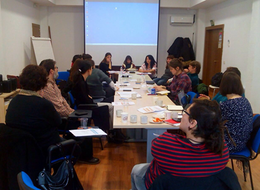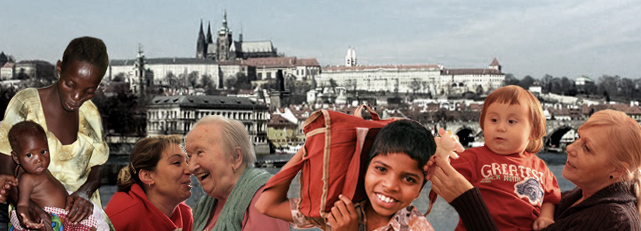The training for experts on stopping human trafficking was devoted to an innovative strategy
The training held in Madrid from February 8th to 12th took place within the Project Chance and Challenge - Improve assistance services for child and youth victims by developing innovative support programs, a project funded by the European Commission, through the Erasmus Plus Program, Strategic Partnerships.
 This event concluded the series of the training programs conducted in the three partner countries - Romania, Czech Republic and Spain.
This event concluded the series of the training programs conducted in the three partner countries - Romania, Czech Republic and Spain.
The five-day training was attended by participants from Romanian, Czech and Spanish partners as well as guests from Spanish National Police, Trafficking in Persons Department, Unit against Immigration Networks and Document Falsification, General Prosecutor Office. Collaborators of the hosts association (TRABE), lawyers, social workers, psychologists, social educators and cultural mediators were also present. The participants also benefited from the presence of survivors of human trafficking who shared their experience working with peer-to-peer technique.
The content of the training involved a large number of specialists who approached the complex phenomenon of trafficking and the services provided to its victims from various perspectives.
The training started with the presentation of the legal framework, statistics and social context of the human trafficking at national and international level. Intervention methods used to facilitate dialogue with people belonging to this vulnerable category were presented by the representatives of the Spanish National Police. The officials brought to the forefront the importance of international cooperation in the fight against human trafficking and they assessed the close collaboration with the Romanian authorities as being positive and effective, considering the fact that a large number of Romanian citizens are trafficked to Spain. Valuable information came also from the representatives of the General Prosecutor Office.
An innovative tool in assisting young victims, the peer-to-peer strategy, was introduced and discussed.
Peer-to-peer method is a strategy that involves the participation of members of a particular group in order to promote change for the benefit of another group. The strategy is often used in promoting individual changes in a bid to change knowledge, attitudes, beliefs and behaviors. The peer education can generate also changes in the entire group or community, rules and collective actions to stimulate change that could have an impact on programs and policies. This approach is based on the belief that people, especially young people, are more willing to listen and respond to information coming from people who have similar characteristics. In this sense, young people who have the role of peer educators must be qualified to play an active role. They also need to be trained on how to convey acquired knowledge and beliefs.
The views and opinions shared by both peer educators and specialists who work directly with victims of trafficking were useful in analyzing the effectiveness of the method, its limitations and the risks that those involved may be exposed to.
The training sessions were interactive and made a real exchange of experiences between Romanian, Spanish and Czech specialists possible.
![]() The Project Chance and Challenge - Improve assistance services for child and youth victims by developing innovative support programs is carriedout by the Association Pro Refugiu, Romania, as coordinator, alongside with partners the Caritas of the Archdiocese of Prague, Czech Republic and TRABE – Iniciativas para la economia social y solidaria, Spain.The project is funded by the European Commission, through the Erasmus Plus Program, Strategic Partnerships.
The Project Chance and Challenge - Improve assistance services for child and youth victims by developing innovative support programs is carriedout by the Association Pro Refugiu, Romania, as coordinator, alongside with partners the Caritas of the Archdiocese of Prague, Czech Republic and TRABE – Iniciativas para la economia social y solidaria, Spain.The project is funded by the European Commission, through the Erasmus Plus Program, Strategic Partnerships.




